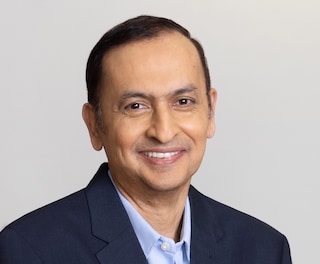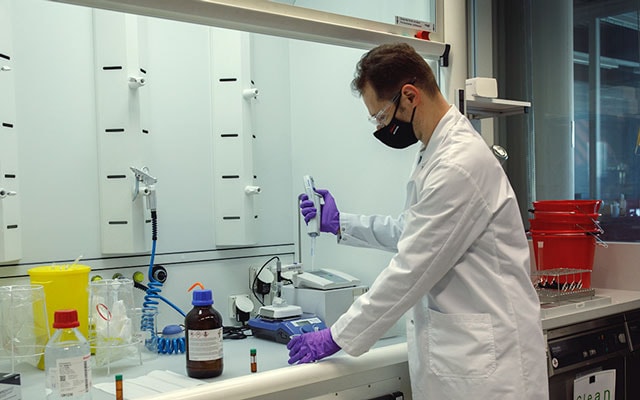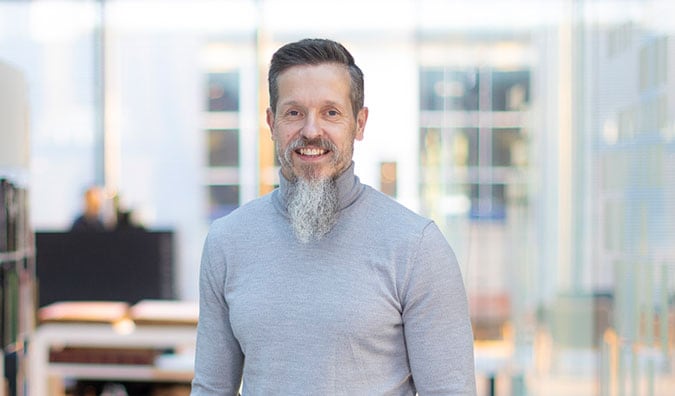At Philip Morris International (PMI), we’re not just transforming ourselves, we’re helping to transform the industry too—and drive change for millions of adult smokers around the world.
But to achieve our smoke-free goal, we also needed to look to experts outside our organization, including those who might seem an unlikely match at first.
With a background in respiratory medicine and 20 years working at the U.S. Food and Drug Administration (FDA), Dr. Badrul Chowdhury had previously considered a career at a tobacco company unthinkable.
However, he discovered that PMI’s goal of delivering a smoke-free future could help address one of the most pressing public health concerns—the harm caused by cigarettes.
Dr. Badrul Chowdhury, Chief Life Sciences Officer at PMI
Dr. Chowdhury, some may find your background surprising for an executive at PMI. Tell us about the path that led you here.
I trained as a respiratory physician, specializing in internal medicine, allergy, and immunology and I have served in a public health role for most of my career, focusing on patient care and medicine development.
For more than 20 years I worked for the FDA, including leading the Division of Pulmonary, Allergy, and Rheumatology Products, which provides scientific and regulatory oversight of therapies for lung, autoimmune, and inflammatory diseases. I then moved to the pharmaceutical industry, first with AstraZeneca and then with a U.S.-based biotechnology company, developing inhalation products for rare respiratory diseases.
When I got the call from PMI, I was a little skeptical at first, but I realized that this company is disrupting its own business model by moving away from cigarettes and developing scientifically substantiated smoke-free products with the aim of reducing the harm caused by tobacco, which would ultimately benefit public health. As a respiratory physician, I’ve worked with patients suffering from chronic obstructive pulmonary disease (COPD), so I know that the most important action they can take is to stop cigarette smoking.
When I heard PMI saying you shouldn’t start smoking, and if you did smoke, you should quit, I began to take notice. I also saw it was committed to replacing cigarettes with less-harmful alternatives to cigarettes. That motivated me to join the company in its smoke-free journey and do my part for the larger public health good.
How did your experience as a doctor shape you to be a leader within a big corporation?
Science and scientific rigor are a vital part of who I am as a professional. I lead with a scientific mindset, guided by what the scientific research reveals. I’m convinced that taking a rigorous scientific approach and making the right decisions will enable us to further develop and enhance our evidence package on smoke-free products.
I’m privileged to work with a team of exceptional scientists—and my focus is on ensuring that we all work even more efficiently together toward the same goal.
What major breakthroughs have we made so far in our research? And what opportunities do you see in the future?
The biggest breakthrough, from a scientific perspective, has been the successful development of smoke-free products that fulfill two critical criteria: They are scientifically substantiated as significantly less harmful than cigarettes, and are satisfying for current adult smokers, which encourages them to completely switch.
Such scientific breakthroughs normally require decades to become reality, yet, in the case of PMI and the development of heated tobacco products, much has been achieved in a very short timeframe, thanks to the USD 10.5 billion the company has invested since 2008 to develop and bring these products to market.
To put this investment into perspective, in the pharmaceutical industry, the average expense for developing and commercializing a new medicine would be approximately USD 1 billion. So, we’re talking 10 times that amount. The investment is serious, and hard for skeptics—which included myself before I joined—to dismiss.
Crucially, PMI has both the resources and the commitment to continue this drive and therefore deliver on its vision. This represents the biggest opportunity for the future and motivates our scientists and clinicians to redouble their efforts.
It is becoming impossible to ignore the real-world evidence emerging in countries where smoke-free products have been introduced.
What would you say to skeptics of our smoke-free message and the science behind our smoke-free products?
There is a history of skepticism about science, so what is happening in the tobacco space is not entirely new. If we look back, even research carried out by governments was not always widely accepted by the public. And, in the more recent past, pharmaceutical companies have had to address the same skepticism because of a public more willing to question their business motives. There will always be skeptics but, ultimately, if the data is truthful, it will prevail.
At PMI, we are open to everyone—from academic investigators to individuals who want to replicate our findings and look at the data, analyze it, or even do part of the study themselves. Tobacco companies have a complex history which we know about, so we must be positively mindful and be more transparent and more accessible than most.
How does your role contribute to the goal PMI is aiming to achieve?
In my role as Chief Life Sciences Officer, I’m further expanding the body of scientific evidence related to our smoke-free products.
Building on the past decade of experience, capabilities, and scientific work, we have started to execute a significant program of biomarker, clinical outcome, and real-world evidence studies to demonstrate both individual and public health benefits resulting from large-scale uptake of our smoke-free products.
It is becoming impossible to ignore the real-world evidence emerging in countries where smoke-free products have been introduced. In Japan, smoking rates have fallen dramatically since heated tobacco products became established in 2017.
Similar examples can be found in Europe. In Sweden, where oral tobacco products are a popular alternative to cigarettes, smoking rates have fallen to one of the lowest rates in the developed world, and far more rapidly than in other EU countries, where oral tobacco has been banned since 1992. Swedish males now have both the lowest smoking prevalence and the lowest tobacco-related mortality in the EU.
The evidence is there and it’s compelling, but we need to keep working to build on it.
Why is it important that we bring together the public and private sectors to help address public health issues such smoking?
It’s simply not possible for one group—be it policymakers, healthcare providers, or the industry—to work independently and achieve success. All must work together.
If there is a product being developed that is a better alternative to cigarettes, but policymakers do not support it, then its uptake will stall.
The issue of cigarette smoking is not unique in its need for business and governments to collaborate. Other areas have previously faced and then addressed this challenge, including vaccine development for infectious diseases (most recently the COVID-19 vaccine), where a cross-sector collaboration ensured there was a coordinated purpose, the right technology, and consistent messaging.
So, recent history has shown us that science can benefit society, whether it comes from governments or business. And, as a scientist who has worked for both government and business, I think the purpose is the same: To offer a better future for the public. If you don’t do that, you will be voted out, or your products won’t sell. This is the reality of life.







